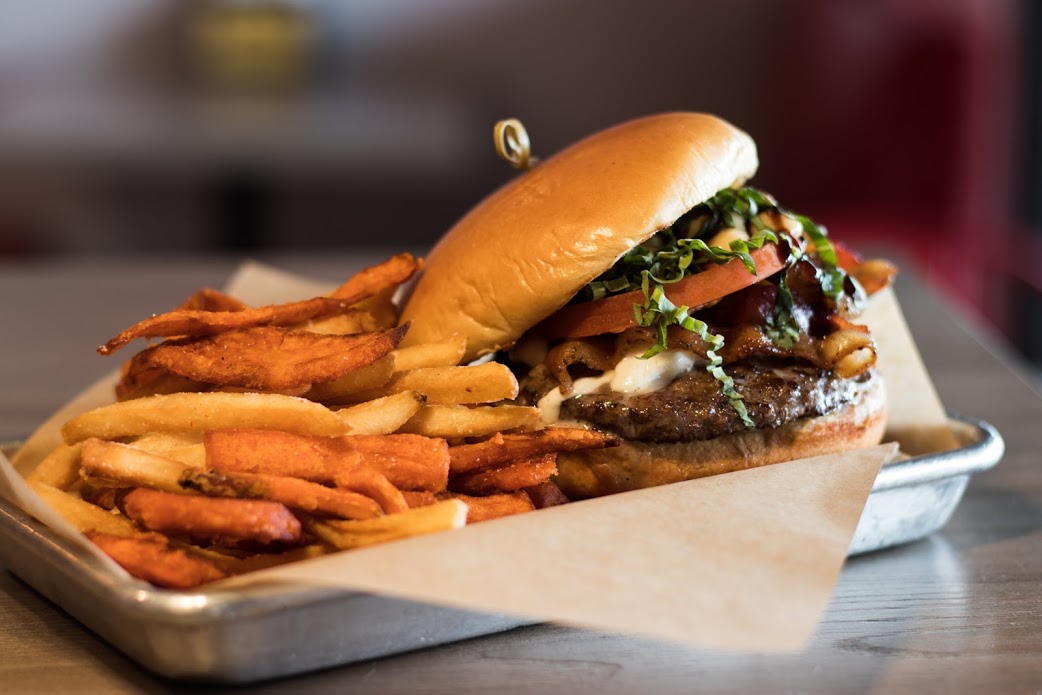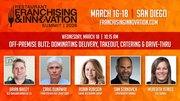Article
7 trucks plus a restaurant in 5 years, Phoenix partners launch consultancy
Having established a set of truck business strategies through trial and error, Kyle Hollenbeck and Tom D'Ambrosio believe they can spare today's food truck newcomers a lot of time and expense by sharing their knowledge.

February 20, 2019 by Elliot Maras — Editor, Kiosk Marketplace & Vending Times
Being part of a relatively new industry, gourmet food truck newbies usually have to teach themselves a lot through trial and error. Kyle Hollenbeck and Tom D'Ambrosio, who launched Aioli Gourmet Burgers & Catering in Phoenix in 2013, taught themselves most of what they know about the business.
While Hollenbeck brought sales experience and D'Ambrosio was a trained chef, there was no textbook on how to purchase a truck, what kind of insurance they needed, how to screen employees, where to take the truck, what inspections they needed, etc. But the duo —assisted by a third partner, Michael Cartolano — believed there was a market in Phoenix for gourmet burgers, so they pooled their resources and launched the business.
"It was all trial and error," Hollenbeck said.
 |
| Catering events such as weddings represents 30 percent of the company's business. |
Today, Aioli Gourmet Burgers & Catering operates seven food trucks, a brick-and-mortar restaurant and an extensive catering business.
There is an executive chef (D'Ambrosio), a sous chef and another 30 employees, including cooks, drivers, salespeople and administrators. The Phoenix headquarters houses the one brick-and-mortar restaurant along with a kitchen that supports the seven food trucks and the catering business.
Having established a set of food truck business strategies through trial and error, Hollenbeck and D'Ambrosio believe they can spare today's food truck newcomers a lot of time and expense by sharing their knowledge. Hence, they recently launched a food truck consultancy.
Seeing a need
"There are a lot of different aspects to this," Hollenbeck said. "You can't just be a chef; you can't just be a people person. You've got to wear both hats sometimes. You've got to be a mechanic sometimes."
The demand for food trucks, meanwhile, continues to grow.
There is still a lot of turnover among food trucks in Phoenix, Hollenbeck said, despite the fact that the majority of the owners bring some foodservice experience. This is because operating a food truck has its own unique requirements that someone with a foodservice background doesn't necessarily understand, Hollenbeck said.
"It made us realize that if we could help some of these people stick around, it would be better for the business," Hollenbeck said.
There is not a lot of food truck education available in Phoenix. Maricopa County's health department website offers some information about buying a food truck and has a food handler class, while Northern Arizona University offers hospitality management classes.
"I think there's a big need for it," Hollenbeck said.
Founders brought key skills
D'Ambrosio brought catering experience working at the Greenbriar resort in White Sulfur Spring, West Virginia, where he attended a three-year culinary apprenticeship training program sanctioned by the American Culinary Federation.
Hollenbeck, for his part, brought sales experience and customer service experience, including a stint at Yelp. The partners, who are childhood friends, both attended Northern Arizona University.
In the beginning, the partners concentrated on having the things that all food truck owners focus on — the truck and food preparation equipment. Hollenbeck and D'Ambrosio have relied on Stradabella, a Phoenix food truck builder.
They also focused on having an aesthetically pleasing website and a social media presence, and taking the time to encourage guests to write reviews.
Early focus on catering
They quickly learned the advantages of serving catered events over street locations and festivals.
"Instead of going to a music festival and paying a $600 fee to be there and hope it doesn't rain, we realized if we can scale doing the private stuff, we can project our sales a lot easier," Hollenbeck said.
One advantage of catering is having a better idea of how many people to serve.
"The guaranteed part of the catering was very attractive to us," he said.
Building the catering business required a dedicated sales focus. They realized that they could not take repeat business for granted — someone had to reach out and ask if they can cater another event.
"We realized there's a sales aspect to this," Hollenbeck said. "We needed to start following up with these people (customers) more frequently."
Hence, they assembled a three-person full-time catering sales staff with an administrative support person.
Brick-and-mortar expansion
Like many food truck operators, Hollenbeck and D'Ambrosio aspired to have a brick-and-mortar restaurant. A brick-and-mortar restaurant offers operational synergies to food trucks, as well as a way to strengthen the brand.
 |
Aioli Gourmet Burgers & Catering has established a following for its gourmet burgers. |
In October of 2017, they opened their restaurant, which includes a 1,200-square-foot commissary to prepare the food for the food trucks.
The restaurant has exceeded sales expectations, reaching around $650,000 in 2018, accounting for about 30 percent of the company's sales.
The partners have added one or two trucks per year, and they have been able to finance the purchase of the trucks with their profits, with the exception of one truck for which they took a loan. They were able to pay the loans off in 18 months, which was about three years ahead of schedule. They also took an SBA loan and a bank loan to invest $150,000 for their brick-and-mortar restaurant.
Finding good employees has been one of the biggest challenges, but they have managed to attract a stable staff to date.
Early in the business, the partners found food truck booking services helpful for finding locations and events to serve. There were about five different local booking services, most of which charged a 10 percent commission.
But as the business grew, they relied less on booking services. Where these services accounted for about 40 percent of the business four years ago, they now account for 5 to 10 percent of the business.
Part two of this two-part series will explore in greater detail what advice Hollenbeck and D'Ambrosio have for aspiring food truck owners.
Photos courtesy of Aioli Gourmet Burgers & Catering.
About Elliot Maras
Elliot Maras is the editor of Kiosk Marketplace and Vending Times. He brings three decades covering unattended retail and commercial foodservice.
 ChatGPT
ChatGPT Grok
Grok Perplexity
Perplexity Claude
Claude





